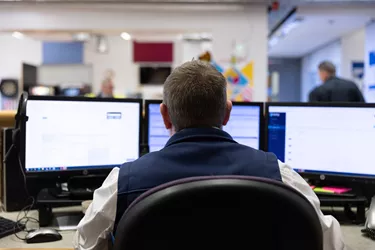Taking care of my money and mental health
Emma shares how money problems affected her mental health and how she found ways to cope.
It happened so quickly:
Becoming self-employed, investing thousands, and having to stop trading after 3 months due to yet another bout of major depression. Being manic and spending £6,000 on someone falsely claiming to be a psychologist and borrowing £3,500 from a friend, unable to pay them back. Breaking down crying in front of a solicitor and law students having to set up a lasting power of attorney because I am unable to manage my money when unwell. Having my best friend and boyfriend sit me down and tell me to reach out for help while I was desperately searching for another credit card to pay one due the following month. Being in over £10,000 debt and having to call my dad, panicking, because I was out of hiding places and didn’t know how to get out of the vicious cycle.
On those occasions, and so many others, I was completely ashamed of myself. For being an ‘adult’ and not being able to manage my own finances. For being highly educated and not being able to manage my finances. For having a stable job and not being able to manage my finances.
I was in total denial.
At times I looked my best when I was in the most amount of debt because I was putting all my energy into covering it up.
I have struggled with my mental health from a young age, and at 25 was diagnosed with OCD and Bipolar Disorder. At the time of diagnosis, I still didn’t realise the impact my mental health had on my ability to manage money, or the impact poor money management had on my mental health.
I was so paranoid about people finding out I was depressed that instead of going on sick leave, I just quit my job. Not being well enough to return to work properly, I ended up unable to pay rent and moving back in with my parents. Surely the shame of my parents knowing wouldn’t be as bad as my friends and colleagues knowing?
I shouldn’t have been ashamed at all.
Keeping up appearances
One of the things that is most upsetting is, I was embarrassed of how others would see me if they thought I was financially unstable. At times I looked my best when I was in the most amount of debt because I was putting all my energy into covering it up. I was trying to project a certain lifestyle: the clean cut, well dressed, well-travelled entrepreneur I thought people expected me to be. Surely people must think I’m rich if I run a business and go to lots of fancy places? This just led to more debt, longer episodes of depression and self-loathing. I was living a double life again.
Good credit = more borrowing = more spending = more debt.
Don’t be ashamed. In society in general, we aren’t well educated in money management, so don’t beat yourself up about it.
The stigma
There’s still a huge amount of stigma around money and mental health. People spend their money emotionally to compensate for how they feel, as an addictive behaviour, lose their job and therefore their income, claim benefits due to incapacity to work, often they're unable to make informed decisions and take out loans or credits cards only to not be able to pay them back. I have done all these things. It is so easy to experience financial difficulty, but these things happen.
Ways to help
While some triggers, symptoms and side effects of mental ill health can be beyond our control, finance isn’t. I hope that some of these suggestions might help ease some of the negativity around finance:
-
Ask for help from someone you trust, charities, debt helplines or Citizens Advice.
-
Speak to your bank and let them know you are struggling with your mental health. Initially, this was nerve wracking, but they aren’t there to punish you, they can help put some buffers in place to support you when you aren’t managing. Things like payment holidays, spending limits, and trusted contacts can be helpful.
-
Don’t be ashamed. In society in general, we aren’t well educated in money management, so don’t beat yourself up about it.
-
Stay calm and take your time finding the right solution. Try not to jump into any high interest borrowing or claiming bankruptcy. No matter how bad things may seem, these aren’t your only options.
While at times it has felt uncomfortable sharing this among friends, family, peers, and clients, doing so breaks down the façade. I have nothing to be ashamed of. I have support in place to help me manage my finances and now feel confident to earn, save, spend, and budget for the first time in my life.
Speak up. Get help. Take back control.
With love always.


Information and support
When you’re living with a mental health problem, or supporting someone who is, having access to the right information - about a condition, treatment options, or practical issues - is vital. Visit our information pages to find out more.
Share your story with others
Blogs and stories can show that people with mental health problems are cared about, understood and listened to. We can use it to challenge the status quo and change attitudes.

















